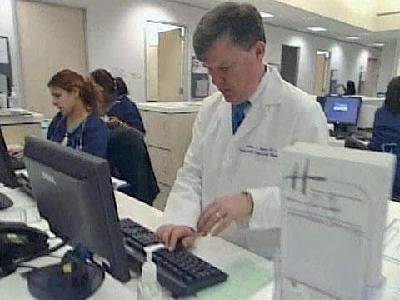
This is the VOA Special English Technology Report.
A new survey finds that more than 80 percent of Internet users in the United States search for health information online. The survey is from the Pew Research Center's Internet and American Life Project and the California HealthCare Foundation.
Susannah Fox from the Pew Internet Project says doctors are still the main source of health information. But the survey found that searching online is one of the leading ways that people look for a second opinion.
SUSANNAH FOX: "People are sort of fact-checking what they have heard from a doctor. Our studies show that people are still very likely to turn to a health professional when they need a diagnosis or are planning a treatment."
Forty-four percent of people are actually looking for doctors or other providers when they search for health information online.
Another finding of the survey: two-thirds of Internet users look online for information about a specific disease or medical condition.
The Internet has also become an important source of emotional support for people with health problems. Susannah Fox says one in five Internet users has gone online to find other people who have the same condition.
SUSANNAH FOX: "It was more prevalent among people with more serious health issues -- one in four people living with chronic disease. And it was basically off the charts with people living with rare disease. They are so eager to find other people online who share their health concerns."
A disease is considered rare if it affects fewer than 200,000 people worldwide. The rise of social networking has made it easier for people with rare diseases to connect with each other and feel less alone.
Social networking is also changing the way some doctors and patients communicate with each other.
Dr. Jeff Livingston operates a medical center for women in Irving, Texas. His office uses password-protected software to share information with patients.
JEFF LIVINGSTON: "We provide the patient full access to their medical care. Anything I can see, the patient can see. All of their notes, all of their doctor visits are right there. All of their lab work is right there."
Dr. Livingston says the software has increased efficiency, reduced costs and improved relations with patients.
JEFF LIVINGSTON: "It has just revolutionized the way we do health care."
His medical center also has a Facebook page, a MySpace page and a Twitter feed.
And that's the VOA Special English Technology Report, written by June Simms. You can stay in touch with us on Facebook and Twitter at VOA Learning English.
We would like to hear your stories about going online to search for health information. There's a lot of information out there. How do you know if you can trust what you find?
You can also post your comments or on our website, voaspecialenglish.com. I'm Steve Ember.
Training medical teams to communicate better during operations
2 billion people expected online by end of 2010
(来源:VOA 编辑:崔旭燕)
